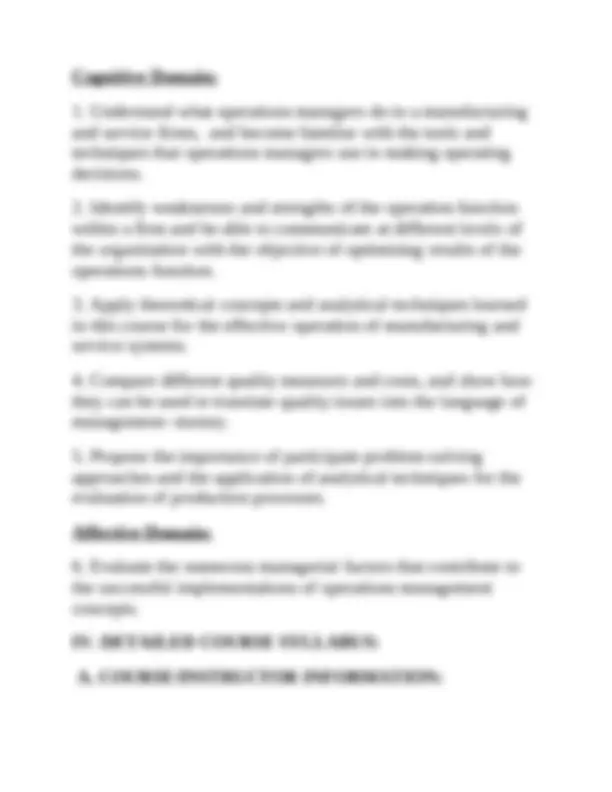
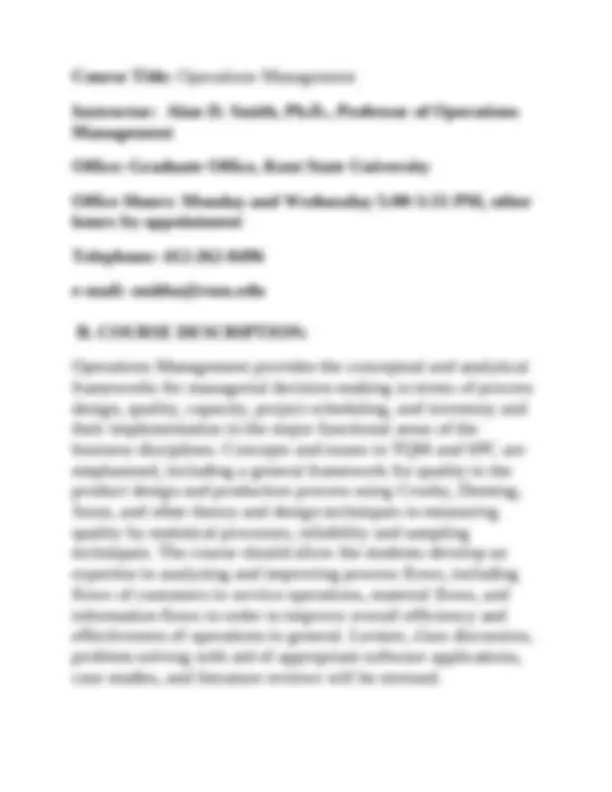
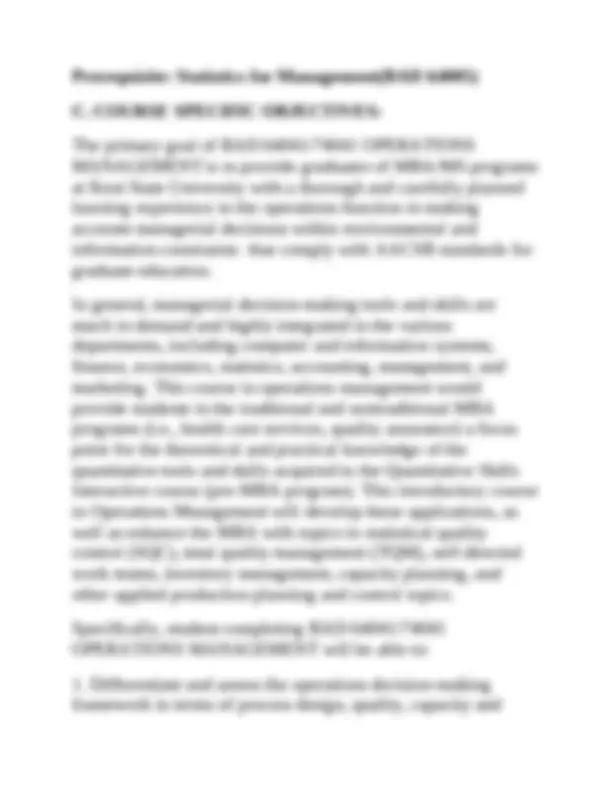
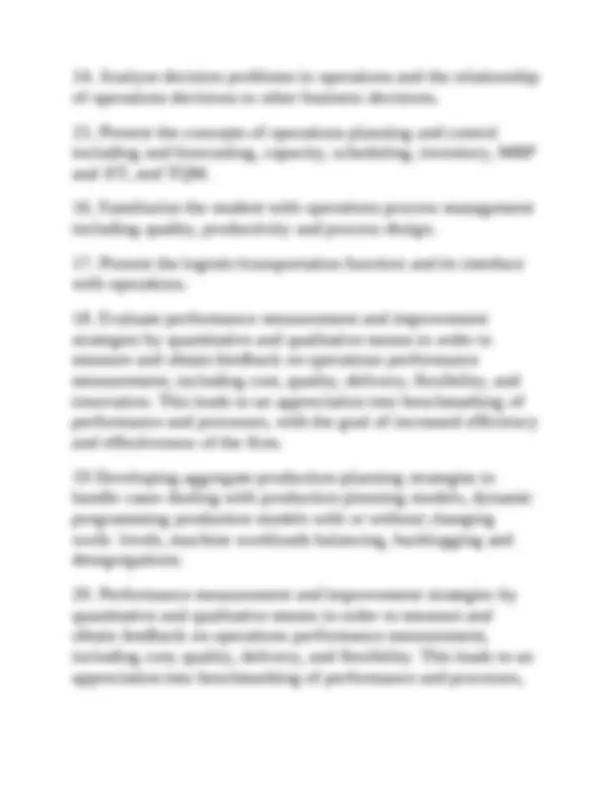
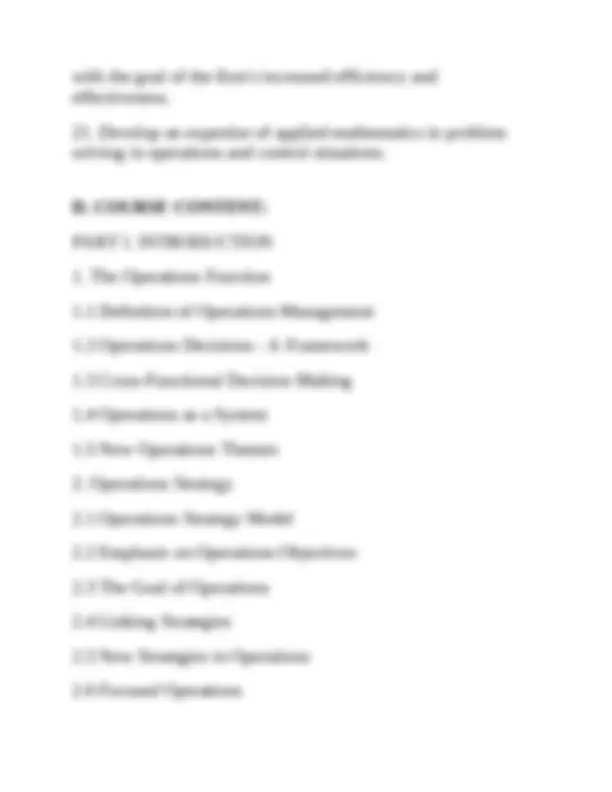
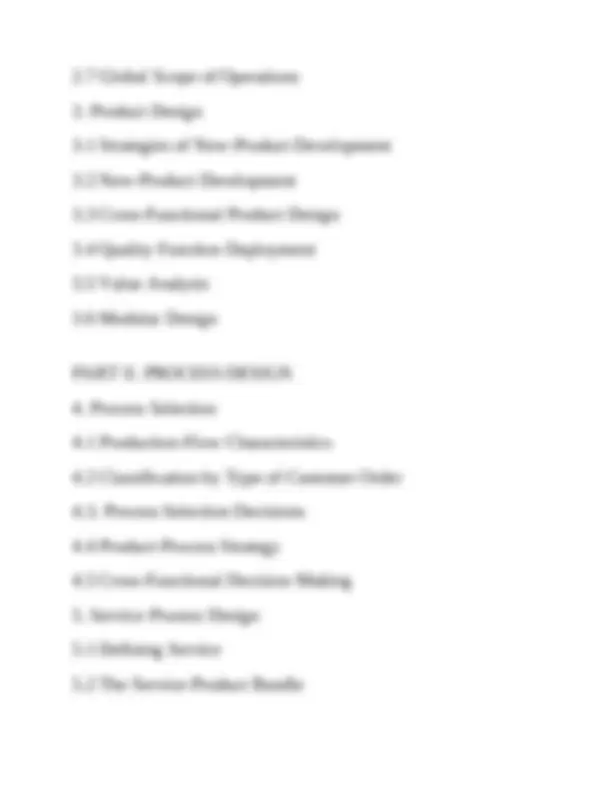
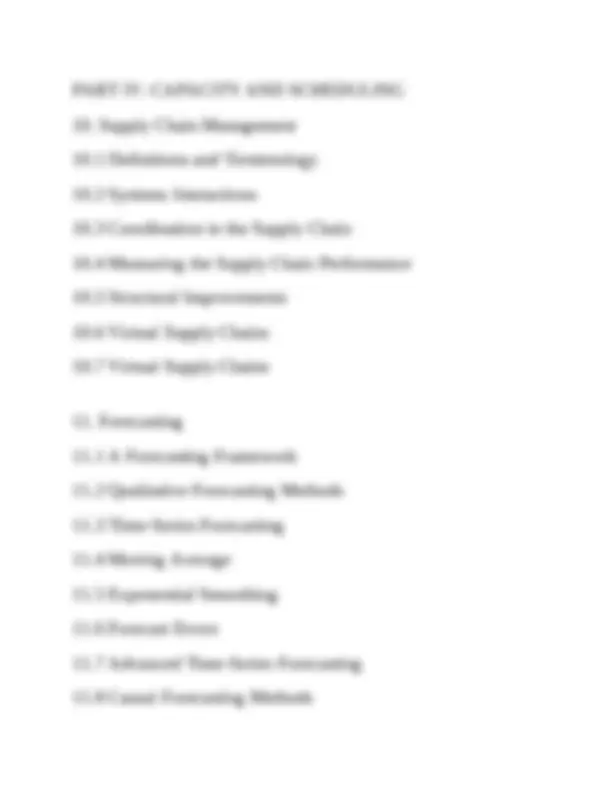
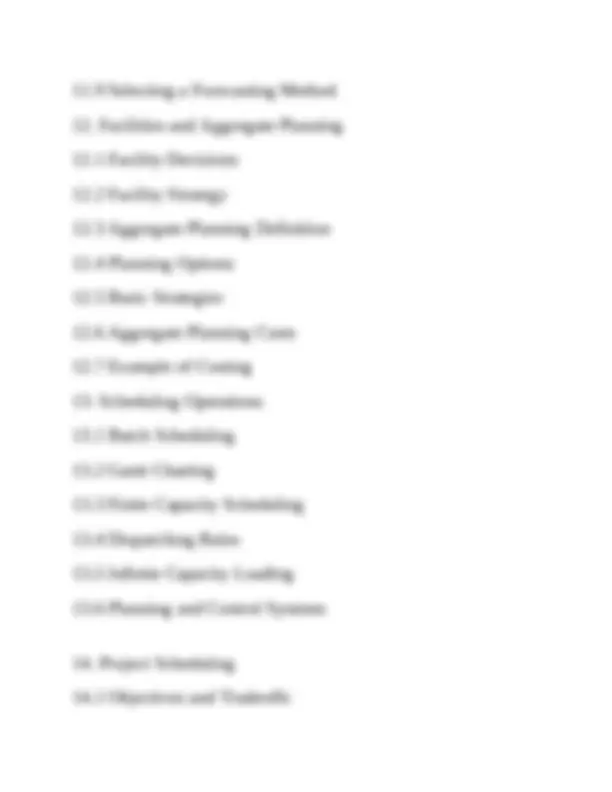
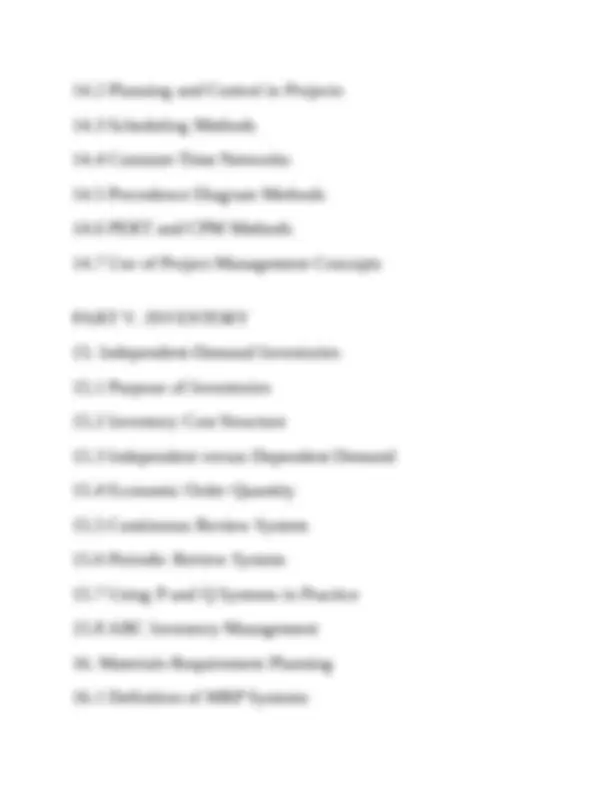
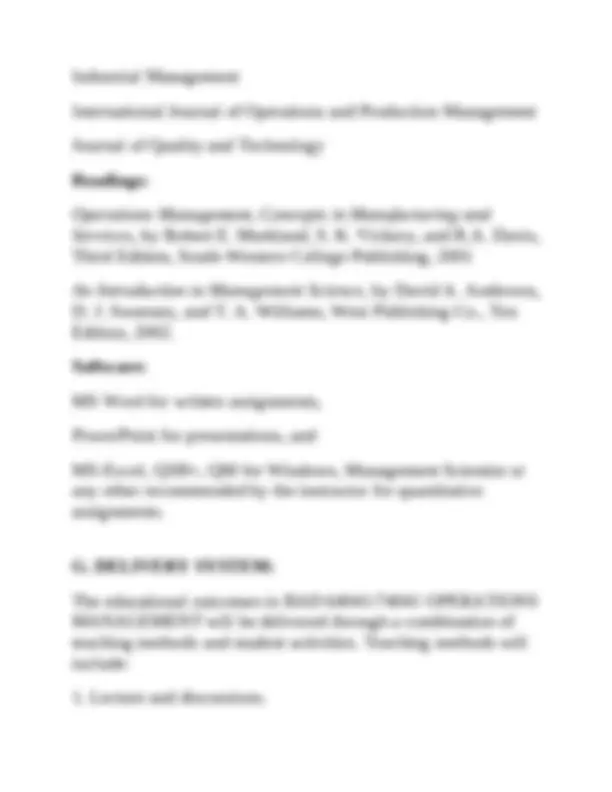
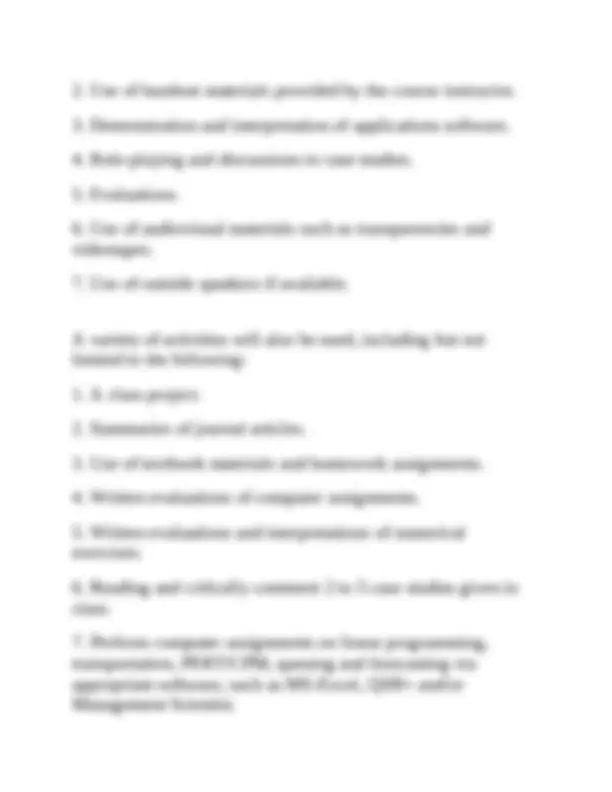
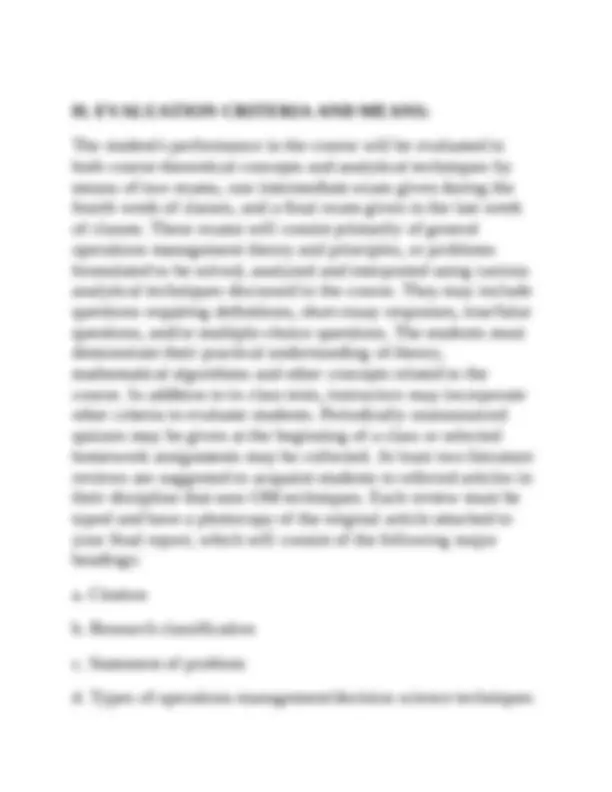
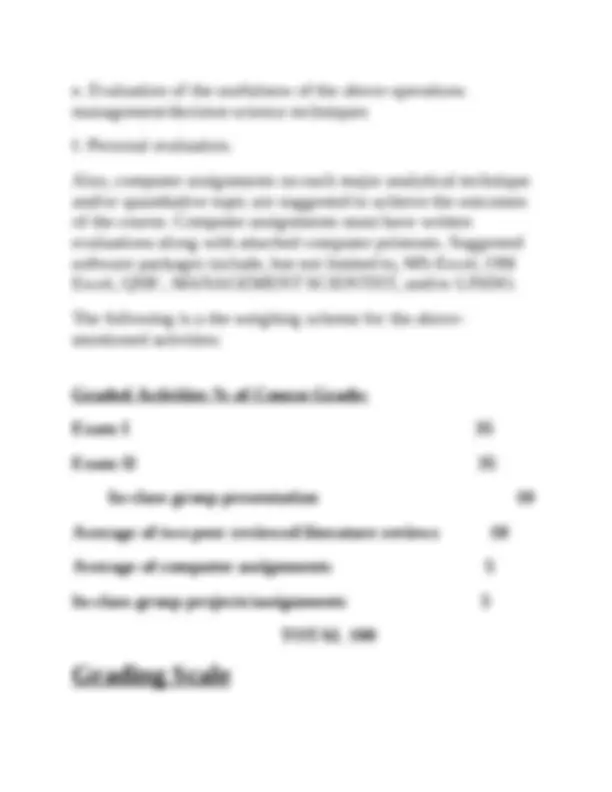
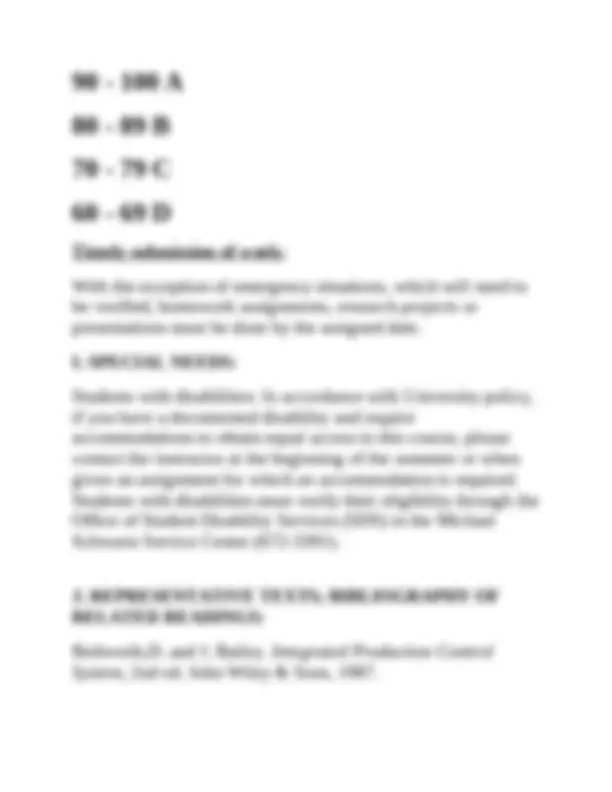
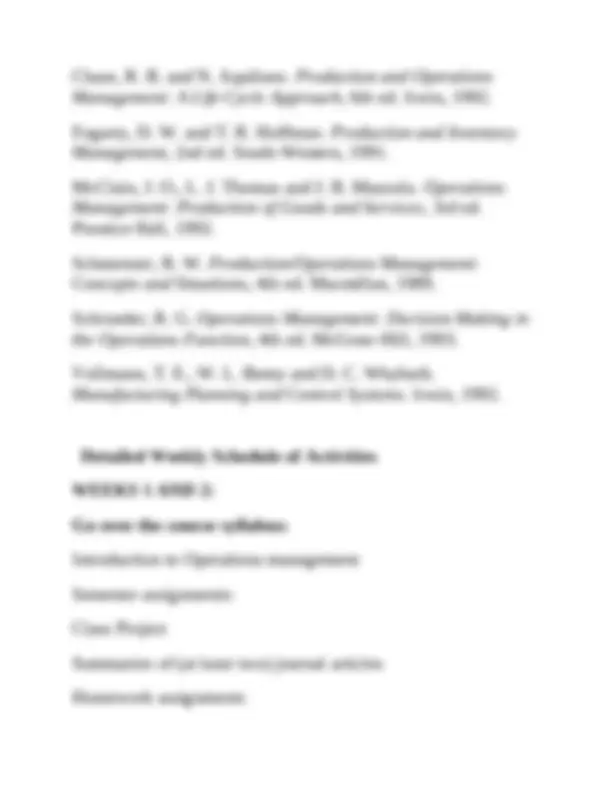
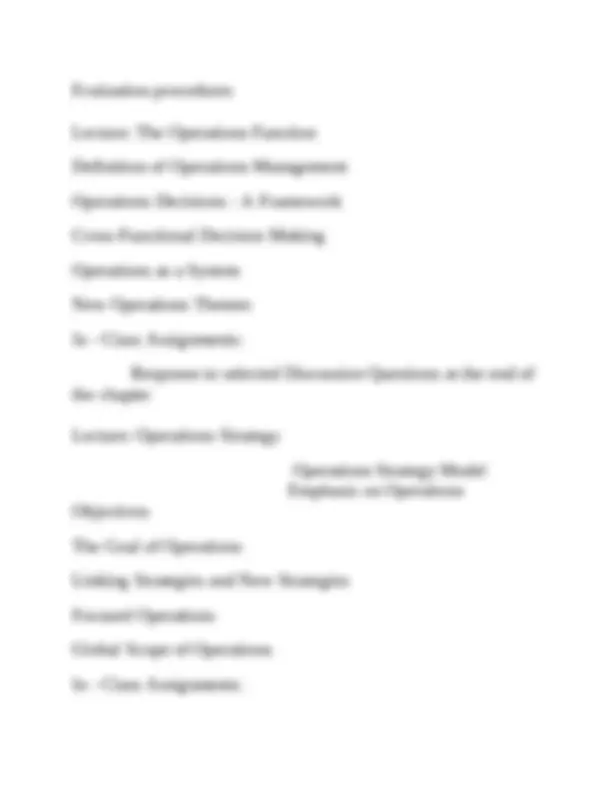
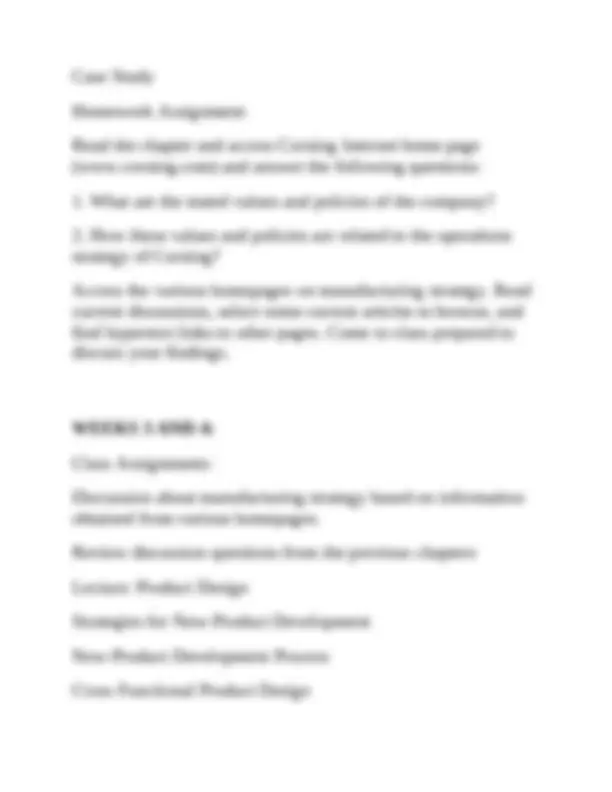
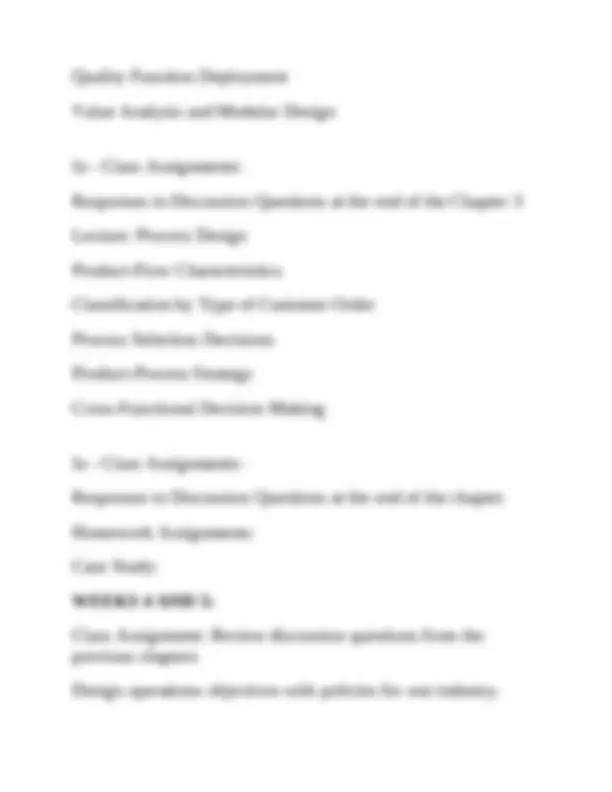
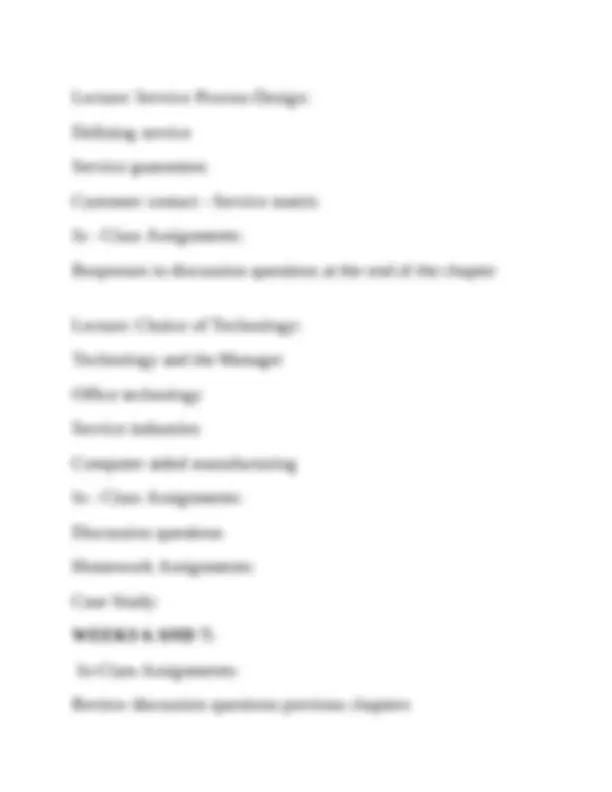
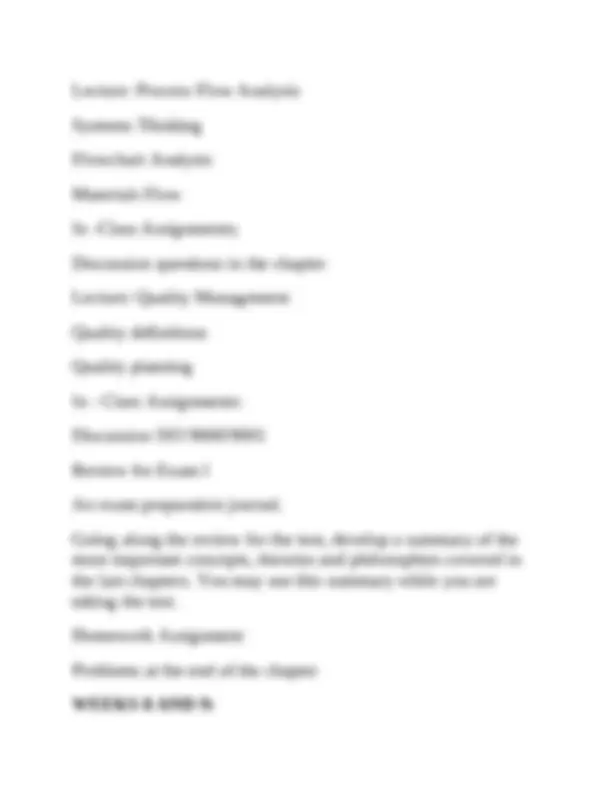
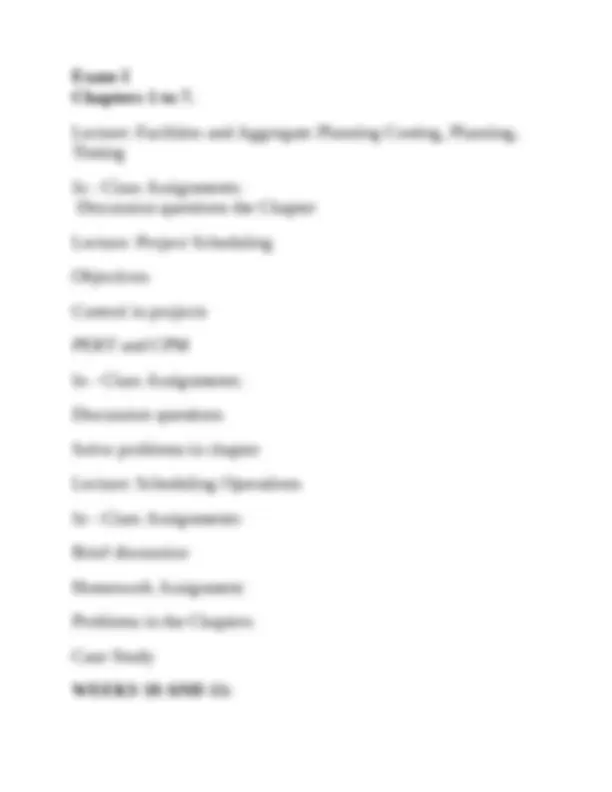
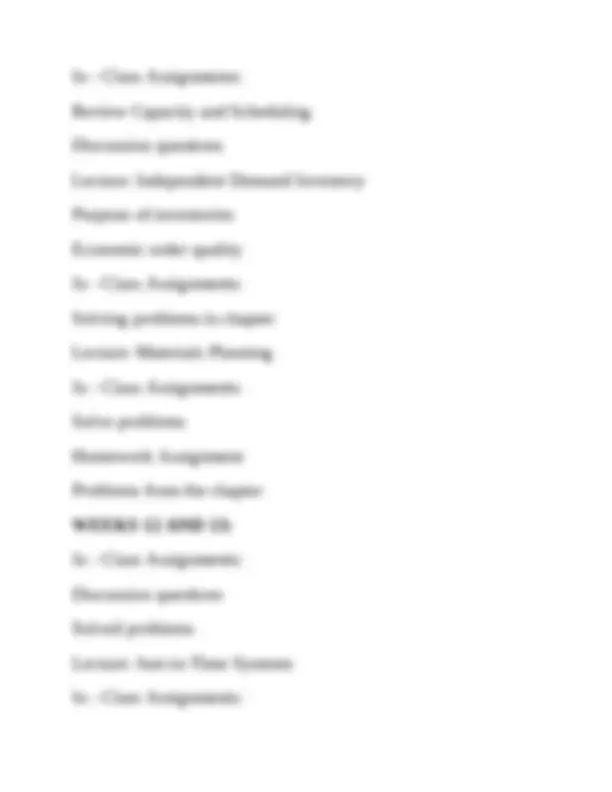
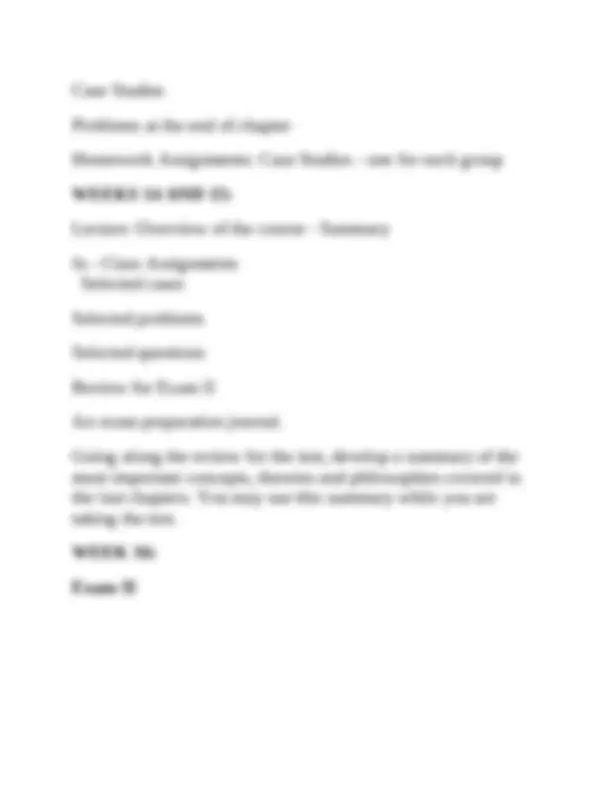


Study with the several resources on Docsity

Earn points by helping other students or get them with a premium plan


Prepare for your exams
Study with the several resources on Docsity

Earn points to download
Earn points by helping other students or get them with a premium plan
Community
Ask the community for help and clear up your study doubts
Discover the best universities in your country according to Docsity users
Free resources
Download our free guides on studying techniques, anxiety management strategies, and thesis advice from Docsity tutors
Information about an operations management course offered at kent state university. The course covers the conceptual and analytical frameworks for managerial decision-making in terms of process design, quality, capacity, project scheduling, and inventory. Students will learn to analyze and improve process flows, develop expertise in statistical quality control, total quality management, and other applied production planning and control topics.
Typology: Study notes
1 / 31

This page cannot be seen from the preview
Don't miss anything!























Kent State University Master of Business Administration Website SYLLABUS BAD 64041OPERATIONS MANAGEMENT (3) COURSE DESCRIPTION: BAD 64041/74041 OPERATIONS MANAGEMENT (3) Develops a framework for analysis of operating problems. Uses computer, quantitative, and behavioral models to develop operating plans consistent with organizations' competitive (or service) strategy. Prerequisite: BAD 64005. I. TO THE STUDENT: The main objective of this course plan, the syllabus, is to assist you, the student, in preparing yourself before coming to a class presentation, in being able to follow a lecture and participate in class, and in doing the adequate work after class. You are going to participate in informal, un-graded assignments in and out of the classroom that allow you to understand the basic theory behind operations management and the quantitative skill used to make decisions in operations. These assignments will prepare for formal, graded assignments where students are evaluated on their mastery of these skills. That is the reason, that your instructor has prepared this syllabus with as much detail as possible. It is actually a tool that will enable you to get the most out of this course.
As we approach the new millennium, the need for organizations to improve all levels of their operations has never been more important. The effective use of their production resources, the focus in continuous quality improvement, and decision-making could be vital for the success of any organization. The operations function is at the core of a business, because here lays responsibility for most of the labor, materials, equipment, information, energy, and capital used to produce goods and services. Knowledge of operations management prepares managers to face the competitive challenge of effectively managing organizational resources. Operations management merges topics from accounting, marketing, industrial engineering, human factors, management science, and statistics into a blend of analytical tools and strategic issues. The main objective of this course is to enable students to become better managers, particularly if they find themselves working in operations management. A sizable part of the U.S. and international work force is employed in operations related jobs. These jobs are important and challenging, and they can lead to rewarding and successful careers. To achieve this objective, several goals were established and are presented in part III. III. GOALS: Upon successful completion of the course, the student should be able to:
Course Title: Operations Management Instructor: Alan D. Smith, Ph.D., Professor of Operations Management Office: Graduate Office, Kent State University Office Hours: Monday and Wednesday 5:00-5:55 PM, other hours by appointment Telephone: 412-262- e-mail: smitha@rmu.edu B. COURSE DESCRIPTION: Operations Management provides the conceptual and analytical frameworks for managerial decision-making in terms of process design, quality, capacity, project scheduling, and inventory and their implementation in the major functional areas of the business disciplines. Concepts and issues in TQM and SPC are emphasized, including a general framework for quality in the product design and production process using Crosby, Deming, Juran, and other theory and design techniques in measuring quality by statistical processes, reliability and sampling techniques. The course should allow the students develop an expertise in analyzing and improving process flows, including flows of customers in service operations, material flows, and information flows in order to improve overall efficiency and effectiveness of operations in general. Lecture, class discussion, problem-solving with aid of appropriate software applications, case studies, and literature reviews will be stressed.
Prerequisite: Statistics for Management(BAD 64005) C. COURSE SPECIFIC OBJECTIVES: The primary goal of BAD 64041/74041 OPERATIONS MANAGEMENT is to provide graduates of MBA/MS programs at Kent State University with a thorough and carefully planned learning experience in the operations function in making accurate managerial decisions within environmental and information constraints that comply with AACSB standards for graduate education. In general, managerial decision-making tools and skills are much in demand and highly integrated in the various departments, including computer and information systems, finance, economics, statistics, accounting, management, and marketing. This course in operations management would provide students in the traditional and nontraditional MBA programs (i.e., health care services, quality assurance) a focus point for the theoretical and practical knowledge of the quantitative tools and skills acquired in the Quantitative Skills Interactive course (pre-MBA program). This introductory course in Operations Management will develop these applications, as well as enhance the MBA with topics in statistical quality control (SQC), total quality management (TQM), self-directed work teams, inventory management, capacity planning, and other applied production planning and control topics. Specifically, student completing BAD 64041/ OPERATIONS MANAGEMENT will be able to:
delivery of services, and integrating the role of technology in the design and delivery of these services.
2.7 Global Scope of Operations
5.3 Service Guaranties 5.4 Cycle of Service 5.5 Customer Contact 5.6 Service Matrix 5.7 Employees and Service
11.9 Selecting a Forecasting Method
16.2 MRP versus Order-Point Systems 16.3 MRP Example 16.4 MRP Elements 16.5 Operating an MRP System 16.6 The Successful MRP System
The course, BAD 64041/74041 OPERATIONS MANAGEMENT, is an integral part of the MBA program, and a very important integrative course of other managerial business disciplines. Therefore, the instructor expects from the students to demonstrate a professional attitude, and also expects from them to: 1 Come prepared to class presentation, participate in class discussions and case analyses, and contribute in class with relevant opinions.
The student's performance in the course will be evaluated in both course theoretical concepts and analytical techniques by means of two exams, one intermediate exam given during the fourth week of classes, and a final exam given in the last week of classes. These exams will consist primarily of general operations management theory and principles, or problems formulated to be solved, analyzed and interpreted using various analytical techniques discussed in the course. They may include questions requiring definitions, short essay responses, true/false questions, and/or multiple-choice questions. The students must demonstrate their practical understanding of theory, mathematical algorithms and other concepts related to the course. In addition to in class tests, instructors may incorporate other criteria to evaluate students. Periodically unannounced quizzes may be given at the beginning of a class or selected homework assignments may be collected. At least two literature reviews are suggested to acquaint students to referred articles in their discipline that uses OM techniques. Each review must be typed and have a photocopy of the original article attached to your final report, which will consist of the following major headings: a. Citation b. Research classification c. Statement of problem d. Types of operations management/decision science techniques